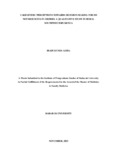CAREGIVERS’ PERCEPTIONS TOWARDS DECISION-MAKING FOR DO NOT RESUSCITATE ORDERS: A QUALITATIVE STUDY IN RURAL SOUTHWESTERN KENYA
Abstract
need for palliative care services has increased with the rise of patients with terminal illnesses. Unfortunately, there is a need for more research in palliative care, especially on end-of-life care and in African societies. Conversations during that period presented ethical and cultural challenges in both collectivistic and individualistic societies. Do not resuscitate (DNR) orders and decision-making surrounding them are a core part of end-of-life discussions. Worldwide, the laws regulating Do Not Resuscitate orders differ from country to country. The factors influencing decision-making also vary from society to society. Studies have shown the need to involve families in this era of rising advocacy for patient-centered care. Caregivers have an essential role in decision-making at the end of life and are involved in end-of-life decisions. However, how they perceive Do Not Resuscitate orders, their expectations while discussing, and the factors involved in decision-making still need to be discovered in our settings. This study aimed to describe caregivers' perceptions of Do Not Resuscitate orders. It also sought factors involved in the Do Not Resuscitate decision-making process for caregivers. Finally, it helped to determine the expectations of the palliative care patients' families while making do-not-resuscitate orders. The study used a qualitative approach and phenomenological research design. The study involved eighteen caregivers of patients receiving palliative care and six healthcare providers. The sampling procedure was non-probability, purposive, and convenient. Data was collected using in-depth interviews and focus group discussions. Thematic analysis was used to analyze the data. The main themes that emerged werelack of awareness and misunderstanding of resuscitation methods. Besides that, there were subjective perceptions based on caregivers' beliefs and emotional responses. Life extension was an overarching factor while having DNR status conversion. Social, economic, spiritual, and cultural factors, the patient's condition, and the healthcare system influenced DNR orders. Appropriate and early communication was the expectation from the caregivers and collectivist decision-making. To have better and more successful Do Not Resuscitate conversations, there is a need to educate caregivers of patients on palliative care on Do Not Resuscitate and resuscitation methods, a need for counseling and preparation, and a need to empower Healthcare providers to hold those discussions.

